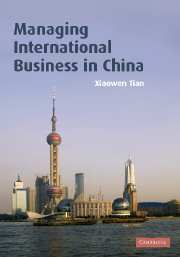Book contents
- Frontmatter
- Contents
- List of figures
- List of tables
- List of boxes
- Preface
- 1 Introduction
- 2 Look before you leap
- 3 Manage guanxi strategically
- 4 Select an entry mode
- 5 Form an alliance
- 6 Negotiating with Chinese partners
- 7 Production operations management
- 8 Marketing management
- 9 Human resource management
- 10 The protection of intellectual property rights
- 11 Corporate finance considerations
- References
- Index
- References
3 - Manage guanxi strategically
Published online by Cambridge University Press: 05 June 2012
- Frontmatter
- Contents
- List of figures
- List of tables
- List of boxes
- Preface
- 1 Introduction
- 2 Look before you leap
- 3 Manage guanxi strategically
- 4 Select an entry mode
- 5 Form an alliance
- 6 Negotiating with Chinese partners
- 7 Production operations management
- 8 Marketing management
- 9 Human resource management
- 10 The protection of intellectual property rights
- 11 Corporate finance considerations
- References
- Index
- References
Summary
The key to get anything important accomplished in China lies not in the formal order, but rather in who you know, and in how that person views his or her obligations to you. The Chinese call this concept guanxi. The term literally means ‘relationships’, but in this context it translates far better as ‘connections’. Of course, it is by no means unique to China: Western society is hardly without its own concept of ‘pull’. It is just that the Chinese have raised guanxi to an art. It pervades the social order, and nowhere more than in today's PRC. If you have guanxi, there is little you can't accomplish. But if you don't, your life is likely to be a series of long lines and tightly closed doors, and a maze of administrative and bureaucratic hassles (Scott D. Seligman (1999, p. 34)).
In addition to the uncertain policy environments discussed in the previous chapter, transnational corporations need to understand and deal with a business culture in China that they are not familiar with. Guanxi is often identified as the most prominent feature of Chinese business culture, and it puzzles TNCs, particularly those from the West. In this chapter we first introduce the concept of guanxi, and then discuss how to manage guanxi in China from a strategic management perspective.
Introduction
Translated literally, the Chinese term ‘guanxi’ refers to relationships with neither a positive nor a negative connotation, as shown in the neutral expression of, say, the relationship between a Mr Smith and a Mr Clegg, the relationship between company A and company B or the relationship between the Earth and the Sun.
- Type
- Chapter
- Information
- Managing International Business in China , pp. 50 - 71Publisher: Cambridge University PressPrint publication year: 2007



